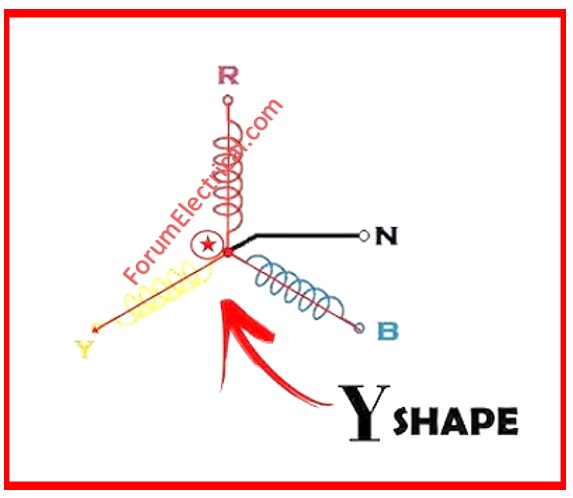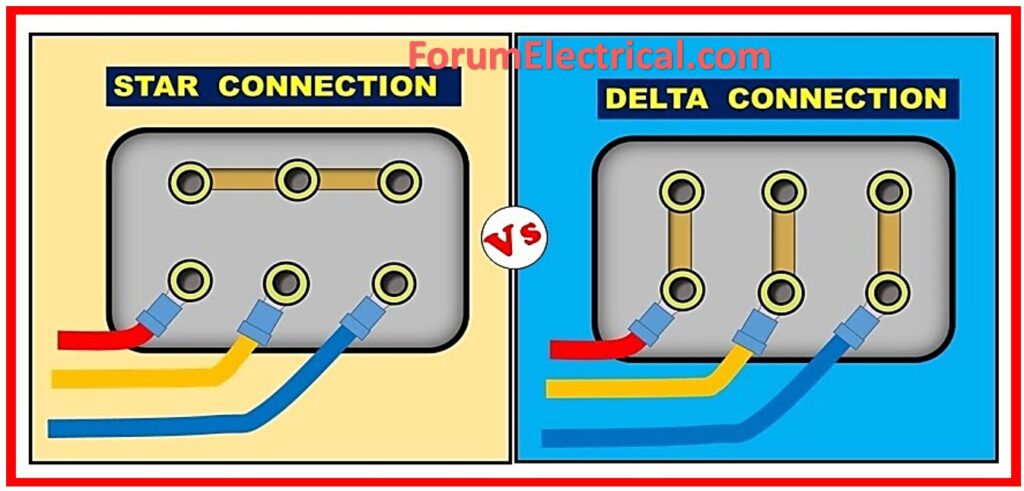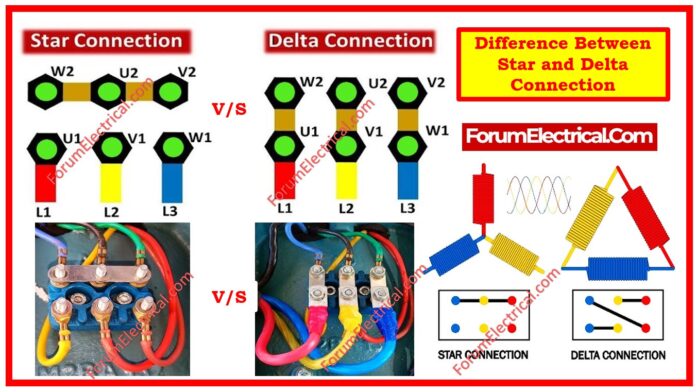Electric circuits are categorized into types namely:
- Single phase AC circuits and
- Three phase AC circuits.
An electrical circuit that raises one phase only and the current in a single wire is called a single-phase AC circuit.
Three phase AC circuits use power in phases with three distinct values in their transmission.
The basic circuit at the very minimum must have 3 wires or conductors that transmit AC voltage at various phases. The three-phase AC circuits are classified into star and delta connection circuits.
Each of these circuits is different from another concerning some parameters.
So, let me explain the difference in more detail.
Star Connection

Star connection is one of the types of three-phase AC circuits.
Star connection is represented by ‘Y’.
This star connection has four cores where out of them 3 are the phase wires and one is the neutral.
The use of such neutral wire assists in avoiding over current and voltage in the electrical equipment.
Star connection can be carried out through three wires (or) four wires.
If only three phase wires are provided then it can be categorized as a three phase three wire supply system.
If three-phase wires and one neutral wire are used then it is called a Three-phase four-wire system.
Advantages of Star Connection
- Star connection needs less insulation and fewer turns of the coil.
- Since neutral wire is employed in star connection, then its application is suitable for the three phase and the four phase system.
- Hence, in the star connection there is no phase shifting of the primary and secondary voltage.
- In case, the middle or the neutral point of the star connection can be earthed.
- The phase voltage VP is determined as
VP = VL/√3 .
- Star connected alternators will need less turns than the delta connected alternator for the same voltage because the induced EMF in an alternator primary winding is proportional to the number of turns.
Disadvantages of Star Connection
- The neutral conductor is very essential in order to balance the voltages. The use and effectiveness of a neutral conductor is rendered non-existent in a system where it can fail; there are potentially elaborate unbalanced voltage levels and even possible system damage associated with a failed neutral conductor.
- The neutral conductor on the other hand transports the return current from the loads. Neutral currents may be fairly large due to the fact that the loads are unbalanced.
- Star connection additionally needs some extra wiring of neutral conductor that raises the installation and maintenance cost of cable.
Applications of Star Connection
- The star connection is widely used in electrical power distribution systems because of the ability of the system to distribute power to the multiple loads efficiently. It centralizes the wiring as well as giving direct control of loads connected to various phases of the supply.
- These motors are mostly connected in star connection in their three phase circuits. The star connection supplies a balanced voltage to start with and offers a high starting torque, although they help to cut down the current and voltage stress on the windings of the motor.
- Most electrical generators like the alternators or synchronous type of generators are normally connected in star. It provides for the creation of a reference point, and as is known, a reference point is necessary to balance the load currents.
Delta Connection
Another type of the three-phase AC circuit is delta connection.
Symbol used for Delta connection is ‘∆’.

This connection is commonly referred to as mesh connection although it is also called delta connection.
Delta connections as we have seen use only three phase wires.
From the above discussions, it is evidently clear that the neutral wire is not in the delta connection.
Mesh connection is another name of delta connection.
In a delta connection the neutral wire is not used; therefore, it cannot protect the circuit against over-current.
Therefore, delta connection is mainly used for the applications in short distance and distribution systems.
Advantages of Delta Connection
- In delta connection, the total cost concerning the construction necessary to implement its type of connection is relatively low.
- The motor used with a delta connection has a simple design.
- Delta connection is less powerful as compared to other types of connections and consumes less amount of power.
- It is seen that the Delta connection provides more torque when compared to the Star connection.
- In the form of connection most of the three phase loads are connected with Delta Connection because in case of unbalanced load there is flexibility either to add some extra load on a single phase or remove some load connected to a single phase. It is rather difficult to do with the star 3-wire load.
Disadvantages of Delta Connection
- The Delta connections do not have a reference point, which is a disadvantage when it comes to grounding as well as fault detection.
- In a delta connection, the detection of faults under the earth’s surface is quite complicated.
- Connections by delta might cause higher phase currents as compared to connections by star.
Applications of Delta Connection
- These flexible connections are normally applied in the high voltage transmissions and distribution circuits because of their abilities to handle highest currents.
- The Delta connections are used in the industrial motors because they offer a more practical and efficient way of driving the three-phase motors.
- The Many generators are configured in the delta connection since it insulates well and is more compact than the star connection.
- The Delta configurations are available in the transformers, mostly. It is utilized in either step-up (or) step-down voltages.
Difference between Star and Delta Connection
Star vs Delta Connection
Three-phase AC is differentiated in two types: star or Y connection and delta or Δ connection.
Two types can significantly differ from each other in some attributes of connection.

The detailed differences between Star and Delta Connection are provided below:
| Parameters | Star Connection (Y) | Delta Connection (Δ) |
| Configuration | All phase windings are linked to a single neutral point, giving a Y shape. | The phase windings are joined end to end to produce a triangular-shaped closed loop. |
| Phase Voltage | The line voltage is 3 times the phase voltage (VL = √3 x VP). | The phase voltage is equivalent to the line voltage, which is represented by (VL) (VL = VP). |
| Phase Current | The line current equals the phase current (IL = IP). | Line current equals 3 times phase current (IL = √3 × IP). |
| Neutral Wire | There is a neutral point, which allows for a neutral wire. | There is no neutral point, and no neutral cable is present. |
| Starting Torque | Generally has a lower starting torque. | Produces more starting torque than star. |
| Power Consumption | Power consumption is reduced due to lower phase current & voltage. | Increased power consumption due to greater phase current. |
| Application | Long-distance transmission applications require a lower starting current. | Used in applications that require a large starting torque, including heavy machinery. |
| Efficiency | Reduced efficiency due to lower power usage. | More efficient power transmission. |
| Insulation Requirement | Insulation is required at lower voltages. | Insulation is required at high voltage levels. |
| Example of Use | It is commonly used in distribution systems & long-distance transmission lines. | Frequent in industrial & motor applications wherein high torque is required. |









